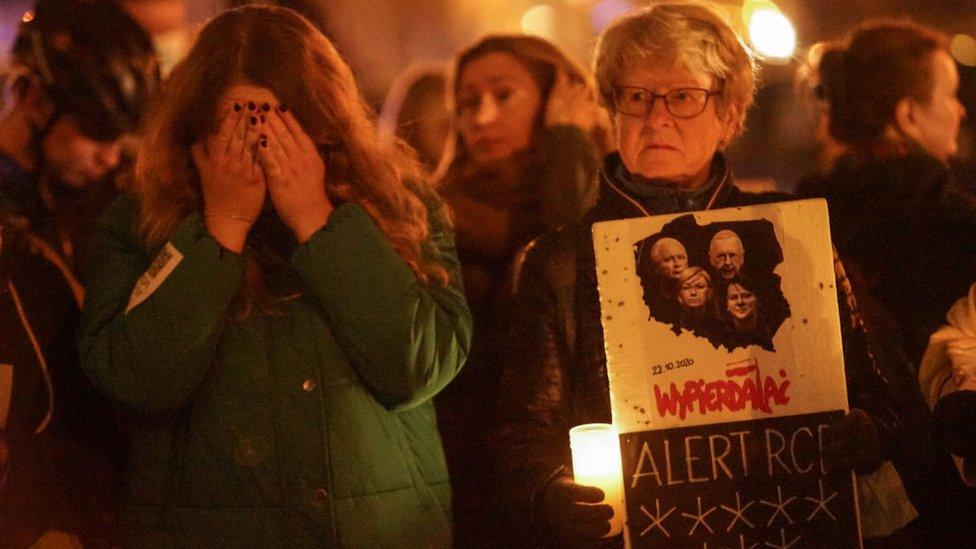Polish abortion law protests over woman's hospital death
- Published

Silent protests took place in several Polish cities including the port city of Gdansk
Protests have taken place in several Polish cities after a family's lawyer linked the death of a 30-year-old woman to tighter abortion laws.
The woman died on 22 September but it has just been highlighted by her family's lawyer, Jolanta Budzowska.
Abortion is now permitted only in cases of rape or incest or when pregnancy threatens a mother's health or life.
The hospital has said its decisions were based on concern for the health of the mother and foetus.
However, the family's lawyer argued that the tighter restrictions meant that doctors waited too long to act. There were silent protests against the near-total abortion ban in Krakow, Warsaw and Gdansk on Monday, a public holiday in predominantly Roman Catholic Poland.
The woman was in her 22nd week of pregnancy when she was taken to hospital in Pszczyna, a small southern town near Katowice, not far from near the Czech border. Her foetus lacked amniotic fluid and, according to a tweet from Ms Budzowska, doctors had waited for the foetus to die.
The mother reportedly sent a text saying her fever was rising and she was worried about going into septic shock, which then led to her death. She leaves a husband and daughter. Protesters blamed last year's abortion law, which outlawed terminations in cases of foetal defects.

A ruling that left doctors 'terrified'

According to the family's lawyer, the woman's death is a consequence of the controversial Constitutional Tribunal ruling introducing a near-total abortion ban, because she alleges the patient's doctors, fearful of the consequences of performing a termination of her pregnancy, instead waited for the foetus to die.
"I think the ruling has made it more complicated for hospitals because medical professionals are terrified now," Antonina Lewandowska from the Federation for Women and Family Planning told the BBC.
"They don't know the law inside out, they only know there is a ban on abortion and they are scared to act." She said the federation was organising legal workshops in clinics and hospitals across the country to raise awareness of what could and could not be done.

Pro-government commentators and conservative legal organisation Ordo Iuris said the law was very simple, that the first duty of the doctors was to save the patient.
The family's lawyer agreed that a termination would have been possible in this instance under the law but suggested poor judgement was made.
In its statement, the hospital was adamant that the doctors and midwives did all they could and all decisions were based out of concern for mother and foetus.
Assessing the legal status regarding abortion was a separate issue, it added. "At this point, it should be emphasised that all medical decisions were made taking into account the legal provisions and standards of conduct in force in Poland."
Protests took place against the ban when it was proposed last year
- Published28 January 2021
